Julie Turner serves a diverse demographic as Special Envoy for North Korean Human Rights | By Martha Vickery (Fall 2024)
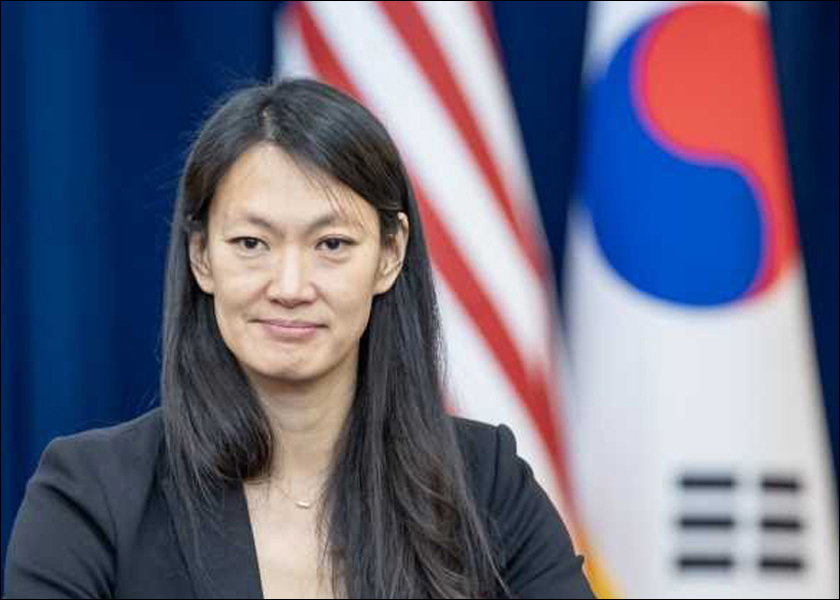
International human rights might be one of the most difficult specialties of diplomacy, but it is the chosen work of Julie Turner, who was sworn as the U.S. Special Envoy for North Korean Human Rights Issues last fall. A Korean adoptee and career diplomat with the State Department, Turner has been working on issues involving people in the East Asia region, Korean people in both North and South, and with Korean Americans for almost 20 years.
Turner is the second such special envoy. The position, an ambassador appointment, was vacant for six years, from January 2017 (beginning of the Trump administration) until President Joe Biden nominated Turner in January 2023. She started the job in October 2023 after a Senate confirmation.
The vacancy occurred despite a law (the North Korean Human Rights Act of 2004) requiring the President to fill this position. There is a bill before the House of Representatives to reauthorize the 2004 law (the North Korean Human Rights Reauthorization Act of 2023), which has yet to come to a vote.
No diplomatic relationship makes diplomacy difficult
As the special envoy, Turner is charged with engaging in diplomacy with the North Korean government to advance human rights. However, the North Koreans are not talking to the U.S. government right now and have not been for a number of years.
Starting the job after a long vacancy, Turner has begun to make some small gains. There is, however, is a bitterly long history of how the U.S. has either ignored or tried and failed in its diplomatic overtures to North Korea (see sidebar below) up to and including many current events as this relationship continues to falter.
Despite not being able to engage officially with the North Korean government, Turner meets and works to advance specific policies with a diverse group of North Korean refugees and South Koreans.
A diverse constituency
Coming into the job after a six-year vacancy, there were a lot of priorities to re-order. As special envoy, Turner has been concerned with Korean Americans’ human rights for many years.
One of these is the predicament of Korean Americans who have family members in North Korea. This subgroup of Korean Americans were born before the 1948 division of Korea, fled their homes in (what is now) North Korea immediately before or during wartime, and eventually immigrated to the U.S. from South Korea.
Many people in this group, all elderly, still have immediate family in North Korea; the majority of these Korean Americans have not seen their family in North Korea since they fled south, after which the border between the two Koreas was closed. Although there were occasional family reunification events with South Koreans and their North Korean family members, Korean Americans were never included in those events. However, some Korean American U.S. citizens have located and visited family members in North Korea up until the 2017 travel ban.
Because a state of war remains between the U.S. and North Korea, normal diplomatic relationships have never been established, and the U.S. has no embassy in North Korea today.
Turner frequently engages with North Korean defectors, both in the U.S. and in South Korea. She works with groups in South Korea who help North Korean defectors. Defectors are conferred automatic South Korean citizenship upon entry to the country.
Turner is concerned with securing citizenship for and recognition of refugees who came to the U.S. from North Korea. A few came directly, but most entered South Korea and established citizenship there first.
She is also concerned with the U.S. citizenship issues of Korean Americans, including adult Korean adoptees without citizenship. A bill in process (the Adoptee Citizenship Act of 2024) would grant citizenship to international adoptees, no matter their citizenship status, including those who have been deported to their birth countries after being criminally convicted. An earlier version of this bill was passed by the House in 2022, but was stripped from the bill it was attached to before going before the Senate for a vote.
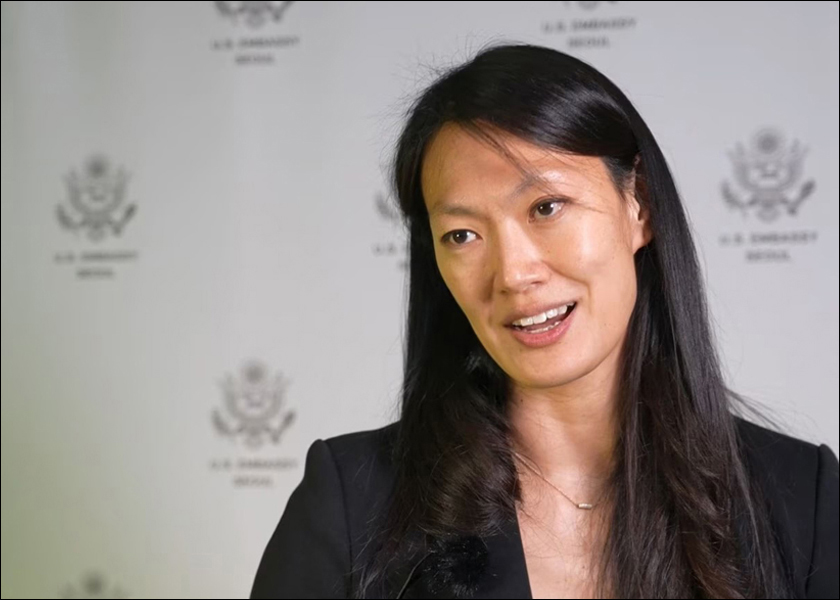
Growing up to be a diplomat
Turner grew up in southeastern Pennsylvania, and like most Korean American kids, was unfamiliar with the issues of Korea and its people as a child. Beyond knowing she came from there, her experience with Korea was limited to attending a Saturday school to learn Korean language and culture and develop familiarity with the local Korean American community.
Her parents always pushed her to form links with Korea and its people and culture, but she admits that until she grew up, she really did not see the relevance. “Like many adopted Korean children that went to Korean Saturday morning schools, I was somewhat resentful that I was spending Saturday mornings at school and not watching cartoons,” she recalled.
She remembers that as a seven- or eight-year-old, she submitted an essay to a children’s magazine, the Pennywhistle Press. Along with her essay, she drew a picture of an American flag, and in the essay, she expressed “gratitude to the U.S.” for citizenship. “So, even as a small child, I think I always expected to serve.”
Although she did not realize it then, Korean school would be her first baby step toward a future vocation in international diplomacy. She learned how to speak Korean early, although she says she feels like her Korean language is “still trapped in my 11 or 12-year-old self.” Some benefits of Korean school were intangibles; how her imagination was expanded to other cultures and people, and growing up knowing other Korean American kids and adults. She also studied the Korean martial art taekwondo, and eventually achieved a black belt and competed in the sport.
As an adult, she said, “even with all that connectivity to Korean culture, Korea was not something I necessarily wanted to focus on as a career path.” That thought would change over time in a big way.
As an undergraduate, Turner went to Pepperdine University near Los Angeles, and studied religion, political science and sociology. In pursuing an interest in social justice, she worked with homeless teens through some non-profits in downtown LA.
After college, Turner was accepted to the University of Maryland’s graduate school of public policy, “then 9-11 happened,” she said. “And I think for a lot of people, it was a world-view-shifting event.”
By that time, she said, she had already worked for a think tank on Middle East policy, and had studied the intersections of Islam, politics and religious freedom. With her research background, she decided to change her M.A. degree concentration to international security and economic policy.
A move to the State Department
Her first full-time State Department job was with the Information Resources Management bureau (Office of E-Diplomacy). She thinks her experiences qualified her; she had worked as a website designer/builder to earn money during her graduate studies, with some training from her dad, who was a systems engineer. She took the job because “I thought I could use my artistic leanings as well as a bit of the computer nerdiness I had been raised with.”
At the State Department, a fellowship bought her time to explore its various departments. She particularly liked the bureau in which she still works, the Department of Democracy, Human Rights, and Labor. With that team, she worked on a report on religious freedom concerning some Central Asian countries. “I fell in love with what that bureau was and that I could continue to use my expertise in the religious freedom and tolerance area,” Turner said. She ultimately accepted a full-time position there.
A learning curve on the East Asia team
She was “quite content” she said, and could have continued, loving that job. But just a few months later, there was an opening in the East Asia team. “Someone in the team had heard that I spoke a little bit of Korean,” she said (with a laugh to emphasize how little Korean language she thinks is still in her brain). The person asked her to consider transitioning to the Asia Pacific group.
“I decided to make the jump, although I did not really know much about Korea from a political or foreign policy perspective. My only interactions with Korea had been through the Korean adoptee community …so it was a pretty steep learning curve,” Turner recalled. She worked on issues in North Korea, South Korea, Japan, and a “huge chunk of Southeast Asia – all places I had not spent a lot of time thinking about before.”
At this point, Turner has now spent 20 years working in the East Asia group; part of that time was as the special assistant to the first Special Envoy for North Korean Human Rights Robert R. King (who served 2009 through 2017). In early 2023, she was appointed to be the new special envoy by President Biden, and in fall 2023, she was confirmed by the Senate. Other offices she held include director for the Office of East Asia and the Pacific, and before that, the director for Southeast Asia at the National Security Council.
A chance she never expected
Today, as a recognized expert in human rights and democracy with a focus in East Asia, Turner said she has reflected on the arc of her career and wondered “Huh, how did I end up here?”
In the State Department, she was in the path of some key career opportunities, she said, although the chance to work for human rights in Korea and for fellow Korean Americans was beyond her expectations. Over time, she has become passionate about the work, especially “in listening to and being responsive to the Asian American community as a whole, who really feel connected to these issues,” she said.
There have been many policy ups and downs during her 20 years as a specialist on North Korea; through it, her knowledge has been steadily building. “But now, the people, the issues, the connections I’ve made, and the stories I now carry with me of some of the divided families or North Korean refugees I’ve met – they’ve all undoubtedly left such a huge mark on my life, that guess I can honestly say I love my job and feel very lucky to do what I do. As hard of an issue as it is to work on, on a daily basis.”
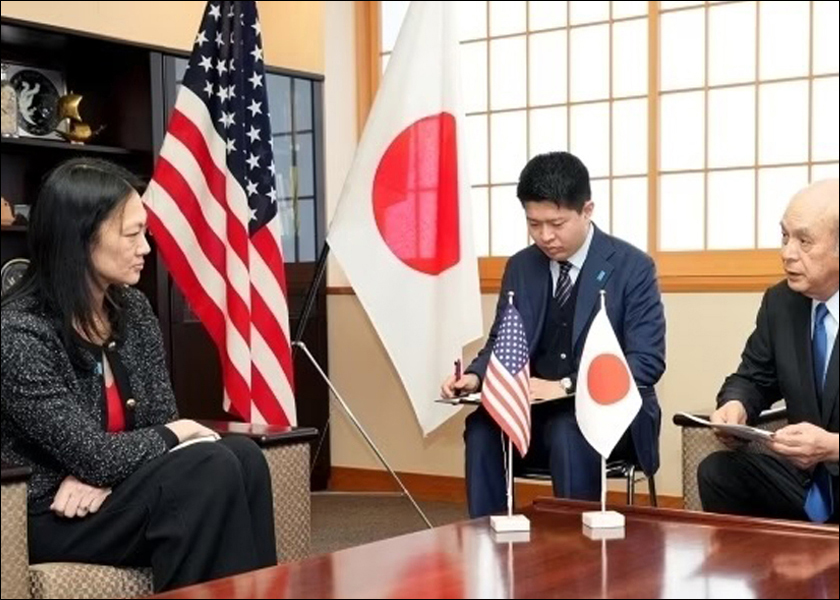
A grasp of the historical context
Part of working with issues in Northeast Asia is understanding the modern history of the region, including the Japanese occupation of Korea (1910-1945), World War II, and the Korean War. In general, “understanding historical context is critical to the work we do here as diplomats here at the State Department,” Turner said.
Diplomacy on behalf of human rights requires an attitude of optimism, patience and the skills to creatively solve problems with diplomatic partners, where often few opportunities are available. Even when an unresolved war legacy exists between countries, diplomats can work on behalf of their governments and keep discussions and partnerships active.
As an example, Turner pointed to how Vietnam and the U.S. improved their diplomacy. The relationship in the post-Vietnam War era was complex, and still is, “but when you look at where we are now, compared to where we were 30 or 40 years ago, you can see how far we’ve come,” she added.
Similarly, Japan and South Korea have rebuilt their relationship in the years since Japan’s occupation and subjugation of Korea, which began in 1910, ended with the surrender of Japan in 1945 at the end of World War II.
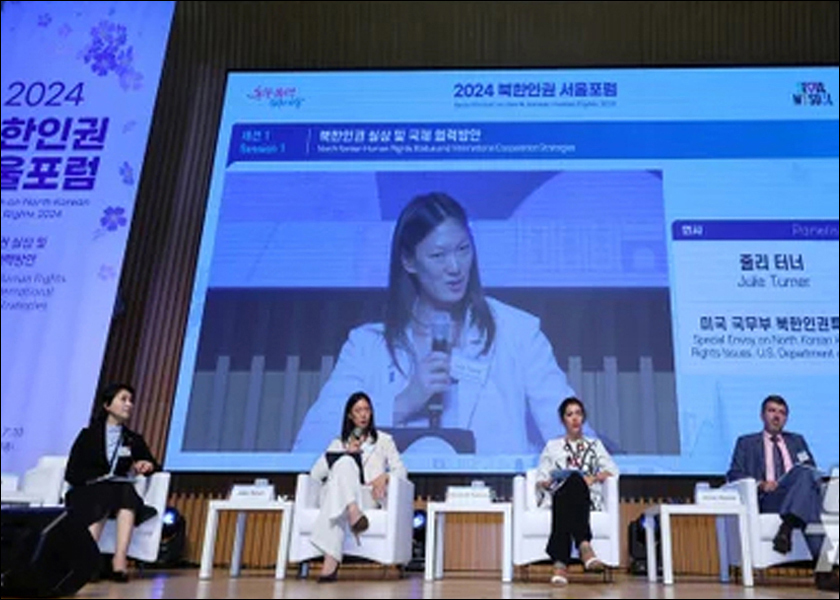
Human rights updates from North Korea
Without a way to personally observe the human rights situation of North Koreans, Turner’s team refers to human rights reporting from the United Nations (generated by the High Commissioner for Human Rights) and other U.S and South Korean sources.
For example, in early July, Turner went to Seoul ahead of South Korea’s official July 14 “North Korean Defectors’ Day,” and participated in the Seoul Forum on North Korean Human Rights, where she met with government officials, civil society organizations, and industry groups. Approximately 6,400 former North Koreans reside in Seoul, according to Seoul Mayor Se-hoon Oh, in his address to the forum.
Turner participated in an April Korea Society forum entitled Capturing Lost Ground on North Korean Human Rights, in which she related how North Korea has completely cut off official communication with South Korea in recent months, and enforced punishments for anyone possessing foreign media or even for using South Korean slang or pop culture references in conversation.
These laws heavily target teenagers and young adults, Turner said in the interview. “I have teenagers myself, and thinking about it in that context is alarming, and really underscores a need for the international community to come together to find a way …to make progress for the North Korean people and protect their rights and freedoms.”
At the forum, Turner noted that it has been 10 years since the UN’s first Commission on Inquiry report about North Korean human rights. That report was derived from testimony given in 2013 public hearings of 80 witnesses and survivors of human rights abuses by North Korea against its own people; it has been instrumental in directing U.S. human rights diplomacy with North Korea.
The crackdown on foreign influences is not recent, although it has intensified. In 2022, Elizabeth Salmon, the UN special rapporteur on human rights in the Democratic People’s Republic of Korea (DPRK) reported on “disproportionate measures” in sentencing against infractions of laws about use of foreign media. These include the 2020 law against “reactionary ideology,” which contained “punishments including the death penalty for accessing foreign information.” Eyewitness reports in late 2022 indicated the government publicly executed two teenagers for watching and distributing South Korean movies in the city of Hyesan, on the China border.
A June report in the Korea Times report noted that there are two other repressive laws concerning the effect of foreign popular culture: one is a 2021 law on education of young people; and one enacted in 2023 on the protection of Pyongyang dialect and culture, which bans use of South Korean pronunciation and slang words.
Activists in South Korea have arguably exacerbated the crackdown by North Korean authorities by sending balloons over the border into North Korea bearing USB drives loaded with K-dramas and pop music, as well as leaflets criticizing North Korean leader Jong Un Kim. North Korea has retaliated by sending balloons carrying trash and human waste to the South.
Defectors describe the tipping point
Turner commented that she has heard a lot about the effects of these laws in conversations with North Korean defectors. One young woman told her that K-dramas, which are typically 16 episodes long, are often loaded onto USB drives with only 14 episodes, leaving fans hanging without an ending to their story. She was watching My Love From Another Star , and “got to the end of the 14th episode, and she was just so consumed with wanting to know how it ended that she actually defected,” Turner related. Safely in South Korea, the young woman was able to call her dad through a network of other defectors, tell him she was okay, and, of course, how the story ended.
On its face, the story was bizarrely funny, but also indicated some important ideas about what kinds of influences move people to act. “Every single North Korean refugee I have met can point to some piece of information, some kind of foreign exposure that set off a light bulb” for them, Turner recalled. Depictions of how people live outside the DPRK are especially influential. North Koreans are also drawn to TV shows and Youtube channels depicting former North Koreans living in new countries, and having lives that are “prosperous in comparison to their own,” she explained.
“For some, it’s just more simple, like a TV show where someone is taking a shower and the bathroom is steaming up with hot water,” she said. One defector saw an movie scene like that, and told her he imagined the prosperity of a home where there was so much hot water, 24 hours a day, she said.
One man told her that he once lived close enough to the border that his own radio picked up South Korean broadcasting. His triggering event was when he heard a news item about a train accident that set the schedule back 30 minutes. He was surprised “that the government would send a message out to the people that the trains were only 30 minutes behind,” Turner explained. “That stuck out, he said, because he had once waited at the train station for three days for a train that was never coming.”
Imagining reconciliation for North Korean refugees
As ambassador, Turner often talks with North Korean refugees about their lives leading to their defection and flight to either South Korea or the U.S. No North Korean refugees have had closure or reconciliation of their traumatic past. Often their new lives are also very difficult in a brand new culture, adding another layer of traumatic stress.
Turner imagines there will eventually need to be a process of “truth-telling and memorialization” of these times. ‘It is a journey,” the ambassador reflected. “…Truth and reconciliation, accountability, all those things are very multi-faceted and require a lot of work and are a long-term process. We’re not going to wake up one day and feel like we’ve reached the pinnacle of accountability for the human rights abuses that have been committed by the North Korean government.”
At present, Turner explained, the assignment to her group is to continue to try to engage, despite the difficult U.S.-North Korea relationship. There are some smaller issues, for example, talking with North Korean leadership about how to improve disability rights there; it’s an area where North Koreans have expressed interest in reforming some laws.
In general, she said, they are using every channel, to send messages that they are ready to get back to negotiations and discussions “because we do want to get back to the table and we are willing to come to the table without preconditions.” However, she said, right now “we are not getting a response.”
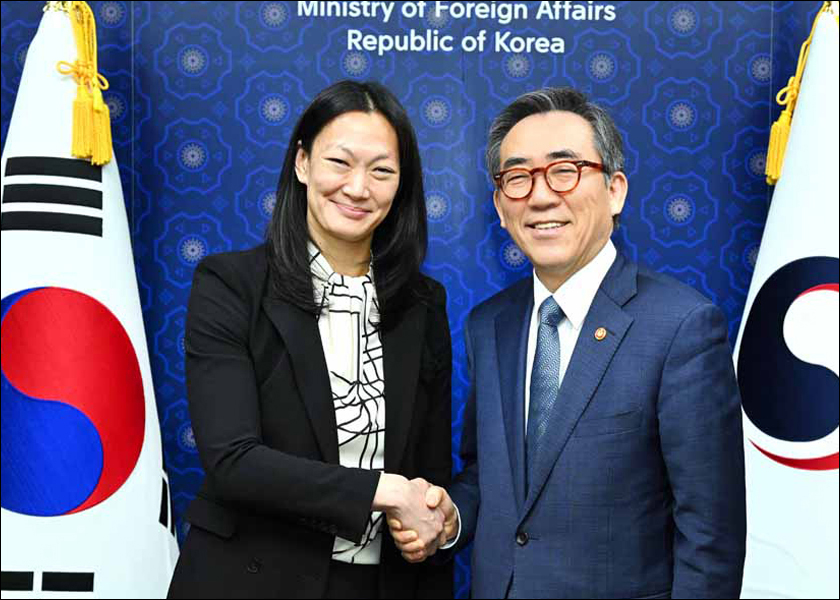
Representing Korean American interests
A big part of Turner’s job is representing the interests and voices of Korean Americans, whether they are North Korean refugees, first-generation South Korean immigrants and their second- and third-generation families, and Korean adoptees and their families. There are also thousands of unaccounted-for American prisoners of war (or listed as “missing in action”), presumably dead, whose families want to repatriate their remains to the U.S. from North Korea. Turner advocates for those families also. There are also families of South Koreans who were abducted to North Korea for various reasons. Some of those family members immigrated and are now Korean Americans.
As part of her work with Korean Americans, Turner frequently discusses issues with the Korean American community, gathering comments and opinions, in order to “feed that information back in the policy-making process, and be responsive with that.”
The next year’s priorities
There is a long list of priorities for human rights in North Korea and for Korean Americans affected by policies towards the country. Picking priority issues is always difficult, however a very time-sensitive one for 2025 is the family reunification issue, since those family members are now in their 80s or 90s.
“I also want to be very focused on providing support to the North Korean refugee community” of the U.S., she said. “They go through so much to get to safety. If they are able to make it all the way to the U.S., we want to make sure we set them up for success.”
For the people inside North Korea, Turner continued, “we want to make space for conversations about disability rights, women’s rights, children’s rights, or really any other conversation we are able to have with North Korea.”
Also on her agenda for 2025 are conversations about improving North Koreans’ rights to information “because I do believe that an informed citizenry is the key to peace, stability and security, and so a government that is responsible and focused on meeting the needs of its people is going to be a better contributor to regional security and stability.” Even as technology makes the flow of information-sharing easier, she noted, “we have to make sure the end-users can consume that information.”
The adoptee identity as an asset
Her current position is very different from others she has had in that her status as a Korean adoptee is an asset, in conversation with the many Korean and Korean American people she works with. By the end of 2024, she will have traveled to South Korea five times. She is still waiting for an invitation to visit North Korea.
“It has been meaningful at a personal level as a Korean adoptee, in having the opportunity to be connected back to Korea,” she said. “One way is with North Korean defectors as I talk about identity, because they are also trying to find own identities as North Koreans in South Korea, or as Korean Americans in the U.S… I get share a lot about my identity as Korean or American, or Korean American.”
She credits her parents for making the Korean American connections that got her thinking about identity early. “When I talk to them on the phone,” she said, “I thank them for that!”
A step forward, two steps back: A short history of U.S.-North Korean relations
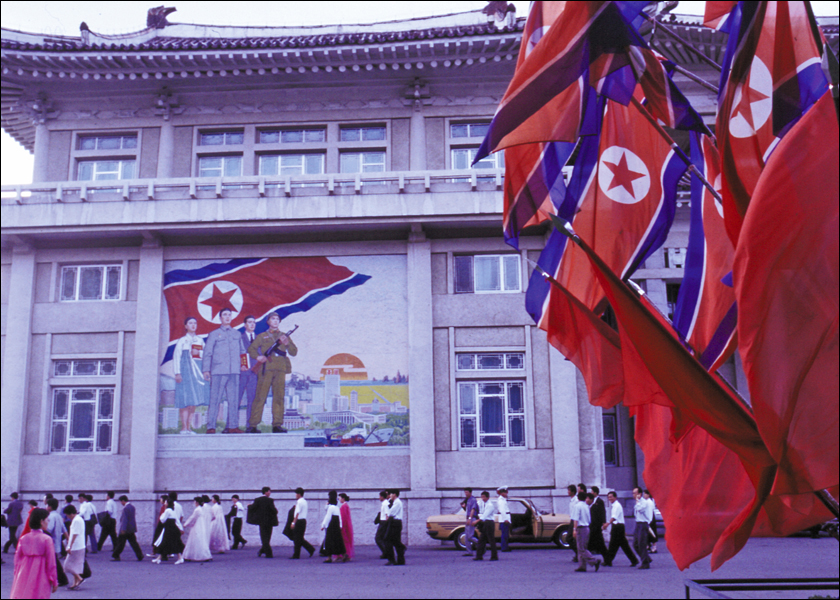
The short history of recent U.S.-North Korea relations is a series of attempts at a step forward resulting in two steps back. The early 1990s were marked by growing concern over the North Korean nuclear missile development program. Then-President Bill Clinton appointed former Secretary of Defense William Perry to get the diplomatic relationship back on track. Perry did so, with help from the South Korean President Dae-Jung Kim.
During the final months of the Clinton Administration, there was a higher level of activity and some warming of North-South relations following the first inter-Korean summit in June 2000. Secretary of State Madeleine Albright traveled to the Democratic Republic of Korea (DPRK) and was filmed as she sat with children in their school playground.
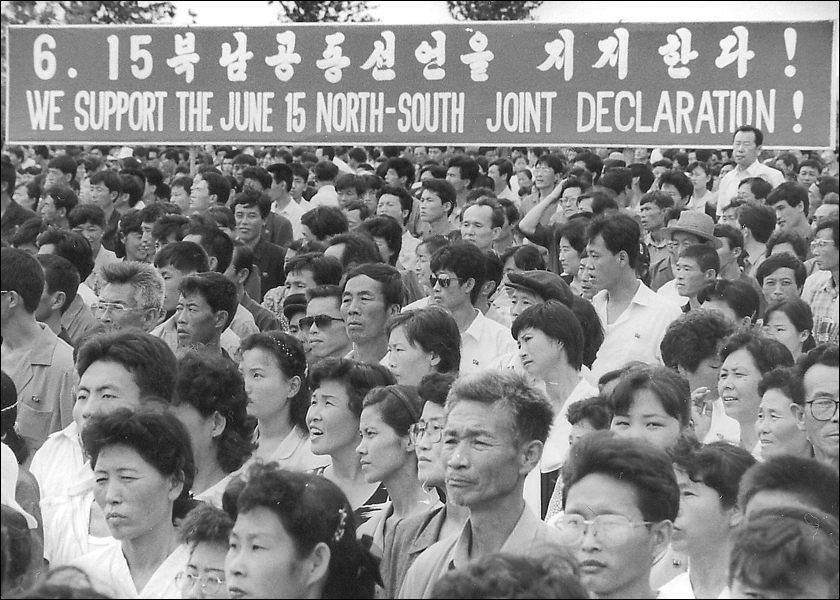
President George W. Bush jettisoned that progress with his hardline tactics and his famous line about North Korea being a part of a global “axis of evil.” While North Korea signaled willingness to negotiate with the Bush Administration, the Bush policy continued to pressure for a “complete, verifiable, irreversible dismantlement” of North Korea’s nuclear arsenal, which left very little room for negotiations.
There were also the Six-Party Talks (2003 to 2009) including China, Japan, North Korea, Russia, South Korea and the U.S., to control North Korea’s nuclear weapons and related research programs. That effort broke down over disagreements on verification issues.
The Obama Administration (2009 to 2016) adopted a policy of “strategic patience” toward North Korea, which resulted in doing nothing to advance diplomatic initiatives. It instead increased sanctions on imports to North Korea, and further isolated the regime.
Finally, the Trump Administration, beginning in 2017, traded the “strategic patience” policy with one dubbed “maximum pressure” which was designed to increase sanctions against and isolation of North Korea. Trump famously said that if North Korea continued its threats against the U.S., it would be met with “fire and fury like the world has never seen.” North Korea continued with its nuclear arsenal development and in 2017, successfully tested the Hwasong-15 intercontinental ballistic missile.
However, in January 2018, North Korean leader Jong Un Kim accepted South Korea’s invitation to participate in the 2018 Winter Olympics in Pyeongchang, South Korea, and Trump postponed South Korea-U.S. joint military exercises until after the Olympics. The Olympics were a hopeful time, and led to an inter-Korean dialogue, including a meeting between South Korean President Jae-in Moon and North Korean leader Jong Un Kim. The two discussed eliminating the threat of war between the two nations.
Kim and Trump met in Singapore June 12, 2018, at which they produced a statement pledging to improve relations and create a lasting peace. North Korea also pledged to “work toward complete denuclearization.” Trump also reportedly agreed to sign a declaration formally ending the Korean War, which was only halted in 1953 with an armistice.
There was some movement toward denuclearization after 2018, however the U.S. and North Korea have been stuck since the 2018 Summit on details including the meaning of denuclearization. U.S. sanctions have stayed in place.
Trump and Kim agreed on a second summit, which was held in Hanoi in February, 2019. It ended abruptly when the Trump team walked out. According to Trump, the U.S. walked away because Jong Un Kim demanded a total lifting of sanctions in return for his country’s concessions. But North Korean Foreign Minister Yong Ho Ri countered that North Korea only sought partial sanctions relief in exchange for closing its Yongbyon nuclear complex. The two sides vowed to continue discussions.
Recently, Biden administration has worked to counter North Korean threats with a “trilateral” military and strategic alliance of the U.S., South Korea and Japan, but has done nothing to modify the sanctions that are one of the major impediments to forging a better diplomatic relationship. There has been consternation at the recent partnership between Russia and North Korea, and North Korea’s dispatch of its own troops to Russia, presumably to fight in the war against Ukraine.
There is recent broad support, including the Korean American community of a bill (H.R. 1369, the Peace on the Korean Peninsula Act), to direct the Secretary of State to advance a peace treaty with North Korea. The bill would also lift or modify the longstanding travel ban preventing Americans from visiting North Korea, so that Korean Americans would be able to visit their family members in North Korea. That bill was introduced during the 2023-2024 Congress, but has not been passed by either House or Senate.


